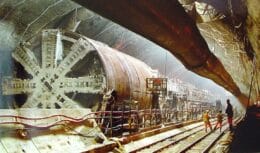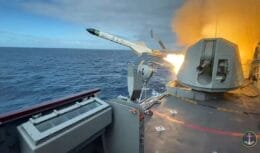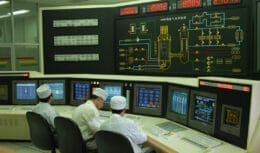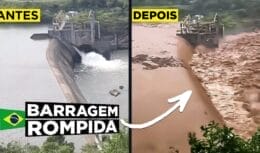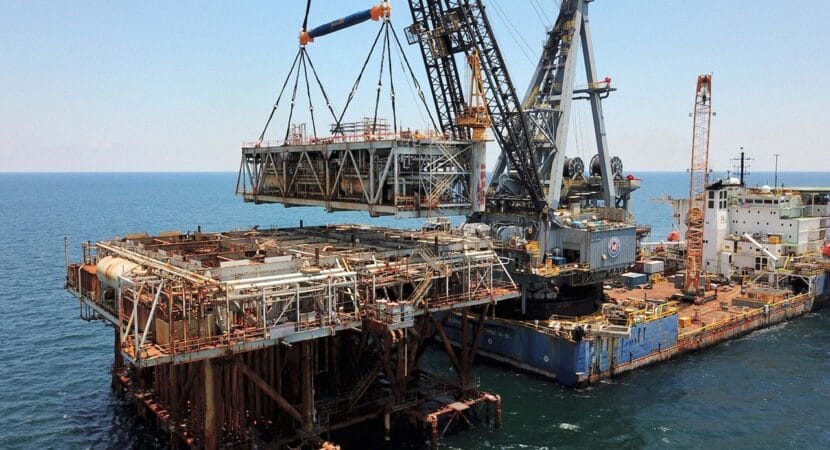
Legal security and regulatory stability play an essential role in attracting investments and the success of the decommissioning sector, say José Mauro Coelho, Guilherme Mercês and Mauro Destri.
EPBR Opinion – The trajectory of offshore oil production in Brazil began more than 50 years ago, around 1968. At that time, the first discovery at sea took place, more specifically in Guaricema field, located in the waters off the coast of Sergipe. After five years, in 1973, the first fixed platform was installed (P-1) of production in the Brazilian sea, marking a historic milestone for the national oil industry.
From this starting point, over the last few decades, numerous discoveries have been made both in the shallow waters of Sergipe and in other areas of the Brazilian coast. Technological advancement has allowed us to explore ever greater depths and, eventually, reach the pre-salt, making us today a global reference in the offshore oil industry.
The set and the oil platforms in Brazil
Brazil has a significant number of maritime platforms intended for oil and gas production. Along the country's coastline, there are more than 170 marine installations. Among these, 55 units, both fixed and semi-submersible, have been in operation for more than 25 years. These platforms are located in the Sergipe (P-23), Campos (P-16), Ceará (P-9) and Potiguar (P-7). It is worth noting that some of these facilities are currently inactive.
Considering that, on average, maritime platforms have a useful life that varies between 20 and 30 years, Brazil has great potential with regard to decommissioning of offshore oil installations.
ANP Resolution No. 817, of April 24, 2020, defines the decommissioning as the set of actions related to the definitive interruption of the operation of the facilities, the permanent abandonment and sealing of wells, the removal of structures, the adequate management of materials, residues and tailings, and the environmental recovery of the area.
These activities involve a series of complex and detailed processes, which aim to ensure safety, sustainability and preservation of the environment. O decommissioning It includes everything from assessing the risks involved to treating contaminated materials, including properly managing the waste generated.
Brazil has a vast stretch of coastline, full of oil platforms that, at the end of their useful life, need to be deactivated and removed. This scenario places the country in a strategic position to become a reference in this activity, generating economic benefits and opening space for the development of technologies and specialized services.
O decommissioning of offshore installations opens up a range of opportunities, both for national and international companies, that can offer innovative and sustainable solutions. Furthermore, the environmental recovery of oil exploration and production areas is essential for the preservation of marine ecosystems and for compliance with international agreements related to environmental protection.
Therefore, it is essential that Brazil invests in research, training and infrastructure to position itself as a protagonist in the decommissioning of maritime platforms, taking advantage of all the potential that this activity offers to the country.
O decommissioning offshore represents a significant challenge for the petroleum industry and natural gas. As production units age, this issue has become increasingly important for those involved in the sector, such as operators, regulatory bodies and local governments.
Currently, the National Petroleum, Natural Gas and Biofuels Agency (ANP) has already approved 82 Decommissioning of Installations (PDI), 34 of which are related to offshore projects.
Worldwide, it is expected that decommissioning attract large investments in the coming years. This trend also applies to Brazil, which stands out as one of the main markets in this business. According to studies, global investments in decommissioning offshore could reach an incredible US$85 billion by the 2020s.
In the Brazilian context, the National Petroleum, Natural Gas and Biofuels Agency (ANP) estimates that investments in decommissioning reach the mark of R$57 billion in the period from 2023 to 2027. This amount covers both land and sea installations. It is worth noting that more than half of this amount will be directed to activities related to the permanent abandonment and destruction of wells.
It is estimated that in the coming years, around 7 thousand wells will need to be decommissioned in Brazil, including more than 600 in the offshore environment. The Campos, Santos and Sergipe basins are the main regions where these investments will take place. Therefore, the country has enormous potential to benefit from these economic activities.
Platform recycling brings new business opportunities to Brazilian industry
Petrobras is starting the platform recycling process in Brazil, which is boosting the local industry and creating an ocean of opportunities. Even without changes to local content, the company is projecting occupied shipyards and enabling the growth of the sector in the country.
Shell is also following this path, deciding to recycle the its first oil field in Brazil. This demonstrates the potential of decommissioning in the country, which brings with it the need to develop an integrated chain of specialized services and broader technical training.
Although Brazil is at a low maturity stage in this industry, continuous development is necessary to keep up with this potential and benefit the local industry, making it even more prepared for this market.
The promotion of a safe and stable legal and regulatory environment is essential to attract investments and guarantee the success of economic activities related to the decommissioning of offshore oil and natural gas installations. This is a complex task that requires significant financial resources.
In Brazil, the decommissioning These facilities can play a crucial role in stimulating economic development, as well as job creation and the nation's prosperity. This measure contributes to strengthening the sector and generating income for the population.
This article presents the authors' view, José Mauro Coelho, Guilherme Mercês e Mauro Destri, in relation to decommissioning by Aurum Decommissioning. It should be noted that the opinions expressed in this content are the sole responsibility of the authors and do not necessarily reflect the position of the institution for which they work or are linked.
O decommissioning is an extremely important activity in marine industry, especially in Guaricema field. This is the process of deactivating oil platforms, such as P-1, P-16, P-23, P-7 e P-9, which are used in oil exploration in pre-salt.
The Aurum company Decommissioning, of which the authors are partners, plays a fundamental role in this process, contributing to compliance with applicable regulations and standards. With its expertise in safety and sustainability, the company helps in the execution of decommissioning responsibly and efficiently.
Guilherme Mercês, one of Aurum’s partners Decommissioning, highlights the importance of continuous investments in research and technology to make the decommissioning safer and more sustainable. He highlights that the marine industry must always be looking for best practices and innovations to minimize environmental impacts and protect natural resources.
Furthermore, the participation of José Mauro Coelho in the company reinforces the relevance of decommissioning for the Brazilian oil industry. It highlights the need for clear and efficient regulations that guide the platform decommissioning process, ensuring that it is carried out in accordance with the highest standards of safety and environmental responsibility.
Mauro Destri, another partner at Aurum Decommissioning, emphasizes the importance of awareness and engagement of all stakeholders involved in the decommissioning. It highlights the importance of clear and transparent communication, promoting mutual understanding and joint work towards a decommissioning Successful.
In short, decommissioning is a complex and essential activity for marine industry and for the preservation of the environment. The authors of this article, as representatives of Aurum Decommissioning, share their insights and perspectives on the subject, highlighting the importance of investment in research, efficient regulations and engagement of everyone involved.
Source: EPBR Agency


